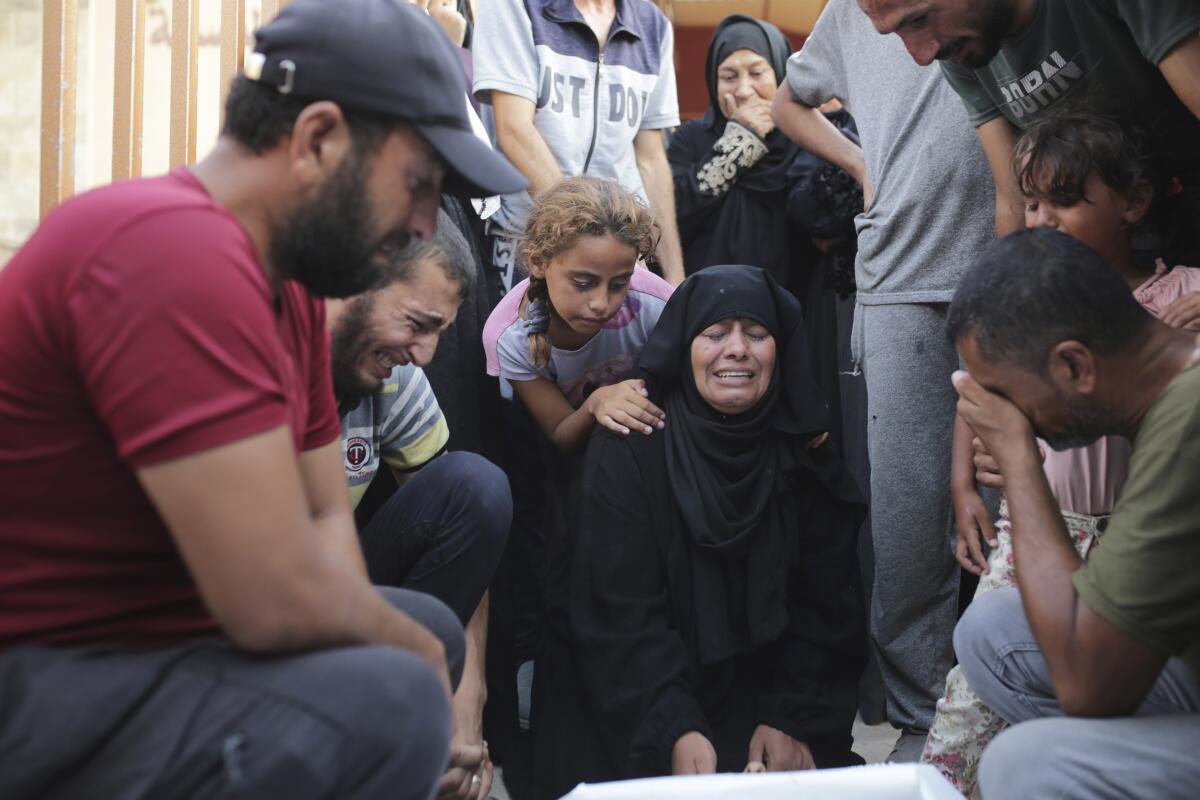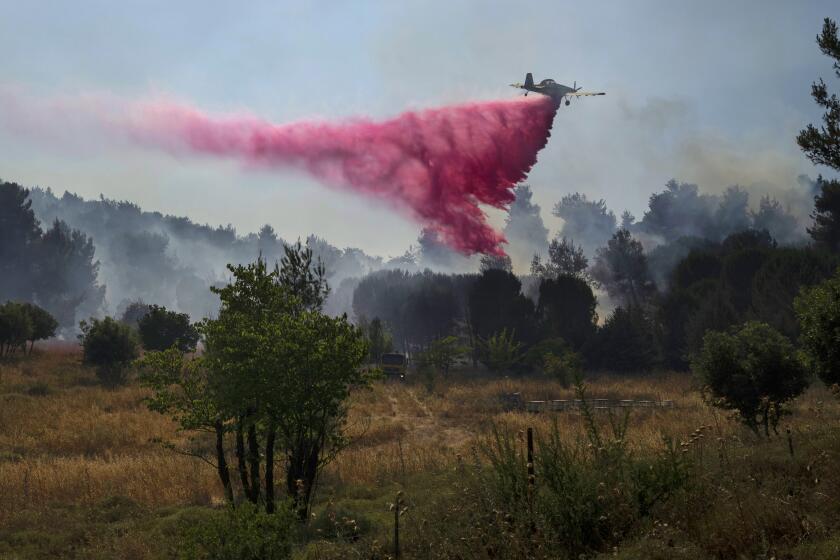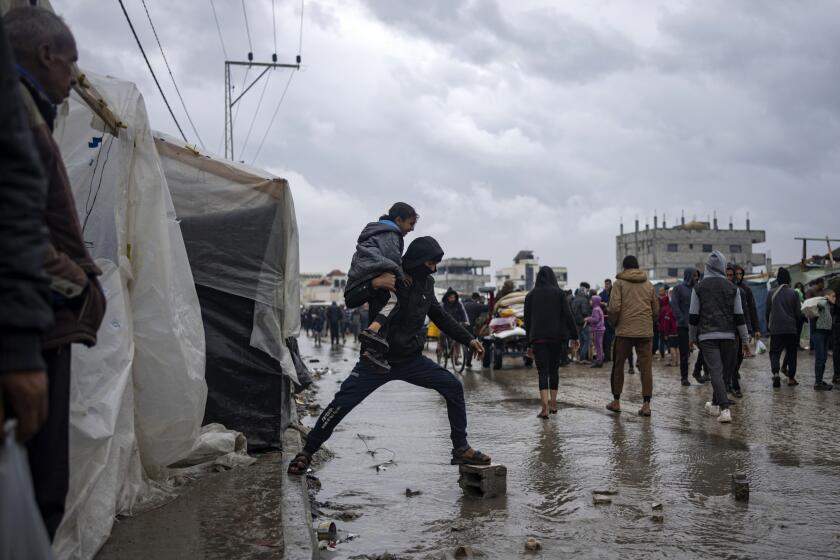Israeli strikes on tent camps near Rafah kill at least 25 and wound 50, Gaza health officials say

DEIR AL BALAH, Gaza Strip — Israeli forces shelled tent camps for displaced Palestinians north of Gaza’s southern city of Rafah on Friday, killing at least 25 people and wounding an additional 50, according to the territory’s Health Ministry and emergency workers.
This was the latest deadly attack in the tiny Palestinian enclave where hundreds of thousands have fled fighting between Israel and Hamas.
It comes less than a month after an Israeli bombing triggered a deadly fire that tore through a camp for displaced Palestinians in southern Gaza, drawing widespread international outrage — including from some of Israel’s closest allies — over the military’s expanding offensive into Rafah.
According to Ahmed Radwan, a spokesperson for the Civil Defense first responders in Rafah, witnesses told rescue workers about the shelling at two locations in a coastal area that has become filled with tents. The Health Ministry reported the number of people killed and wounded in the attacks.
The locations of the attacks provided by Civil Defense were just outside an Israeli-designated safe zone.
The Israeli military said the episode was under review but that “there is no indication that a strike was carried out by the IDF” in the area, referring to the Israeli Defense Forces. It also did not offer details on any other strikes or what their targets might have been.
Israel has previously bombed locations in the vicinity of the “humanitarian zone” in Muwasi, a rural area on the Mediterranean coast that has filled with sprawling tent camps in recent months.
Israel-Hamas war: In Qatar’s capital, a compound housing Palestinian medical evacuees from Gaza is a living catalog of what war does to the human body.
Witnesses whose relatives were killed in one of the bombardments near a Red Cross field hospital told the Associated Press that Israeli forces fired a second volley, which killed people who had come out of their tents.
The attack began with a munition that only made a loud bang and bright flash, said Mona Ashour, who lost her husband after he went to investigate what was happening.
“We were in our tent, and they hit with a ‘sound bomb’ near the Red Cross tents, and then my husband came out at the first sound,” Ashour said, holding back tears while clutching a young girl outside Nasser Hospital in nearby Khan Yunis.
“And then they hit with the second one, which was a little closer to the entrance of the Red Cross,” she said.
Hasan al Najjar said his sons were killed helping people who panicked after the first strike.
The escalating war between Hezbollah and Israel — coupled with scorching heat — has sparked fires that are destroying forests and farmland.
”My two sons went after they heard the women and children screaming,” he said at the hospital. “They went to save the women, and they struck with the second projectile, and my sons were martyred. They struck the place twice.”
Disagreements over the endgame could doom the Israel-Hamas cease-fire deal if the warring sides aren’t willing to negotiate.
Israel says it is targeting Hamas fighters and infrastructure and that it tries to minimize civilian deaths. It blames the large number of civilian casualties on militants and says it’s because they operate among the population.
Israel is pushing ahead with its military operation in Rafah, where more than a million Palestinians had sought refuge from fighting elsewhere in Gaza. Most have fled Rafah, but the United Nations says no place in Gaza is safe and that humanitarian conditions are dire as families shelter in tents and cramped apartments without adequate food, water or medical supplies.
Elsewhere in the Gaza Strip, Civil Defense teams recovered the bodies of five people who were killed in an airstrike that hit two apartments in Gaza City in the north, and several others were wounded. An airstrike earlier Friday hit a municipal garage in the city and killed five people.
Fadel Naeem, the orthopedic chief at Ahli Arab Hospital, said bodies of 30 people had been brought there Friday, calling it “a difficult and brutal day in Gaza City.”
Meanwhile, the Israeli army said Friday that two soldiers were killed in combat in central Gaza. No information was given about the circumstances of the deaths of the two, both men in their 20s. Three other Israeli soldiers were severely injured, the army said.
With Israel’s war against Hamas in its ninth month, international criticism is growing over Israel’s campaign of systematic destruction in Gaza, at a huge cost in civilian lives. The top United Nations court has concluded there is a “plausible risk of genocide ” in Gaza — a charge Israel strongly denies.
Israeli ground offensives and bombardments have killed more than 37,100 people in Gaza, according to the territory’s health ministry, which does not distinguish between combatants and civilians in its count.
The situation has been worsened by a dramatic plunge in the amount of supplies reaching the U.N. and other aid groups to distribute to the population.
Israel launched the war after Hamas’ Oct. 7 attack, in which militants stormed into southern Israel, killed some 1,200 people — mostly civilians — and abducted about 250.
Also Friday, the head of one of the largest hospitals in northern Gaza says his staff has recently registered some 250 children suffering from malnutrition and that the numbers are raising daily due to acute food shortages.
Dr. Husam Abu Safyia, director of Kamal Adwan Hospital, urged the international community to pressure Israel to allow more food and other products into the Gaza Strip, warning that conditions are dire in the besieged territory. Israel controls all of Gaza’s border crossings.
Abu Safyia told the Associated Press that medical authorities have sent teams from his hospital to centers housing displaced people in north Gaza to assess them for malnutrition.
He said flour is the most available foodstuff in north Gaza and that people need more proteins and fats to keep healthy. Northern Gaza was badly affected by the fighting during the early months of the war and is still suffering food shortages.
Abu Safyia added that illnesses are spreading in Gaza as trash piles grow because authorities lack the resources to remove garbage and sewage from the streets.
“We are facing a real disaster,” he said, adding that more people could die in the coming days if food does not flow into the Gaza Strip.
Shurafa writes for the Associated Press. AP writer Jack Jeffery in Ramallah, West Bank, contributed to this report.
More to Read
Sign up for Essential California
The most important California stories and recommendations in your inbox every morning.
You may occasionally receive promotional content from the Los Angeles Times.














